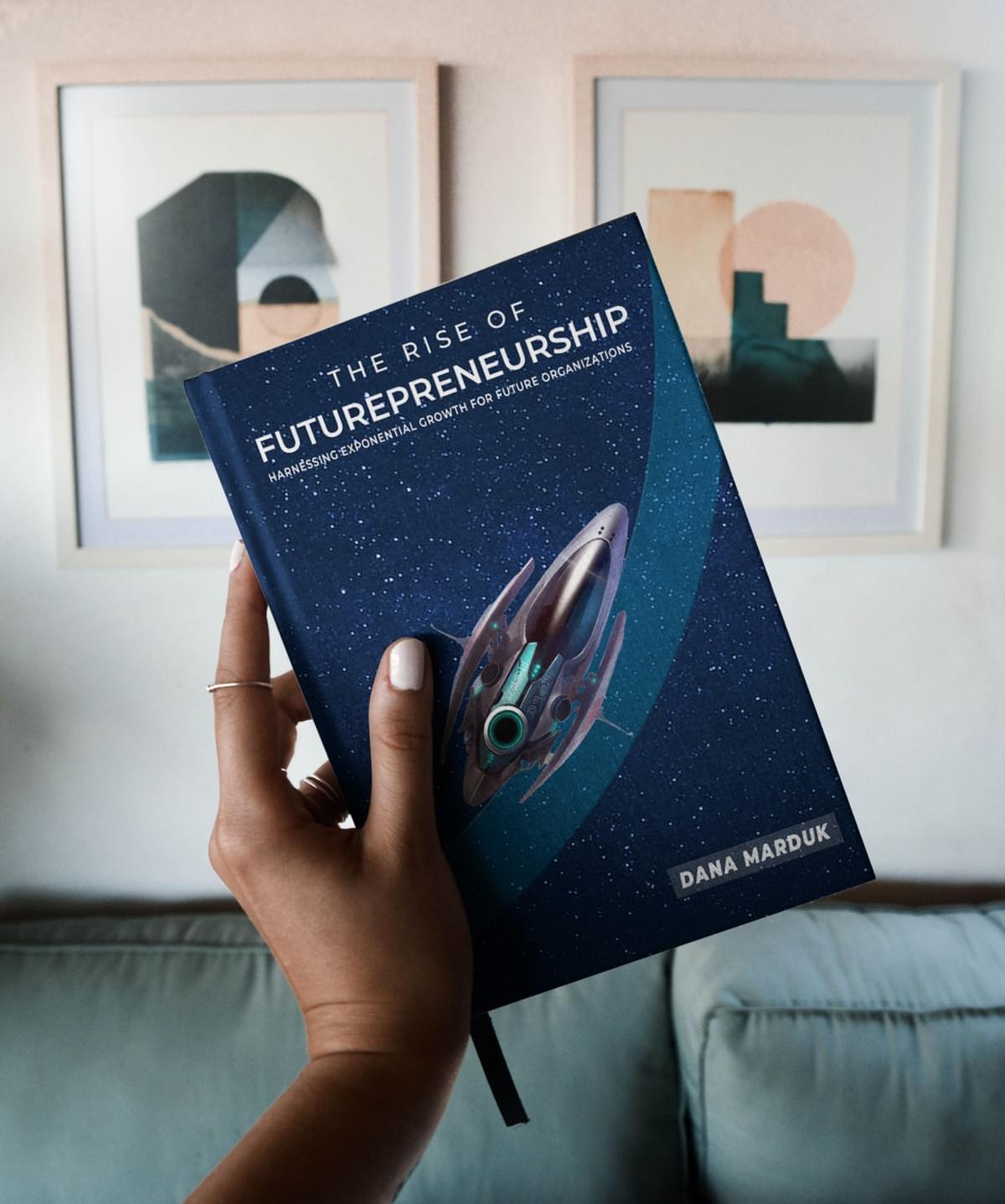

DANA MARDUK
FUTUREPRENEUR, DBA
DOCTORATE OF LONGEVITY,
CEO at FUTURE COMPANY
FUTUREPRENEUR, DBA
DOCTORATE OF LONGEVITY,
CEO at FUTURE COMPANY
THE RISE OF
FUTUREPRENEURSHIP
HARNESSING EXPONENTIAL GROWTH FOR FUTURE ORGANIZATIONS

THE RISE OF FUTUREPRENEURSHIP
WHY AND HOW TO BECOME A FUTUREPRENEUR
7 PILLARS OF FUTUREPRENEURSHIP

How it started?
Over the past 15 years, I have actively engaged in entrepreneurial endeavors, successfully establishing numerous startups. However, my journey took a compelling turn six years ago when I became a distinguished member of the World Futures Studies Federation and commenced an in-depth exploration of "Futures Studies." Immersed in the subject matter, I gradually recognized the intrinsic synergy between Futures Thinking and Entrepreneurship, leading me to envision an integrated concept that transcends the boundaries of both fields; thus, the conception of "Futurepreneurship." This realization sparked a profound interest, driving me to explore the potential amalgamation of these disciplines, envisioning a transformative and comprehensive approach to entrepreneurial ventures.

CONTENT:
Chapter 1:
Introduction - The Evolution of Business and the Need for Futurepreneurship
- Evolution of Business and Entrepreneurship
-The Limitations of Traditional Entrepreneurship
-Exponential Changes in the 21st Century
-The Need for Futurepreneurship
- Five Pillars of Futurepreneurship
-The Role of Futurepreneurs in the 21st Century
Chapter 2:
Entrepreneurship, the rise, shine and wane
- Defining entrepreneurship and its core principles.
- The stages of the entrepreneurial journey, from ideation to launch and growth.
- Characteristics and traits commonly associated with successful entrepreneurs.
- Different types of entrepreneurship (e.g.,small business, social entrepreneurship, high-growth startups).
- Why entrepreneurship can not cope with the exponential changes in the 21st century
Chapter 3:
Futures Thinking; a new tool to anticipate and create futures
- Futures thinking and its importance in anticipating and preparing for the future.
- Various methods and approaches to futures thinking, such as scenario planning, trend
analysis, and foresight techniques.- The concept of a futurist and their role in studying, analyzing, and projecting
future trends.- The skills and tools that futurists employ to identify emerging opportunities and
challenges.- The value of collaboration between futurists and entrepreneurs.
- The benefits of incorporating futures thinking into entrepreneurial endeavors.
Chapter 4:
Exponentialorganizations; The fuel for Futurepreneurship
- What is exponentialorganizations
- 11 attributes of an EXO
- How Futurepreneurs use EXO model to transform futureorganizations
Chapter 5:
AI andEmerging Technologies; The Rise of Intelligent Futurepreneurship
- AI and Emerging Technologies in Futurepreneurship
- How AI and Emerging Technologies Shape the future of business
- Exploring the Impact of AI and Emerging Technologies in Futurepreneurship
- Harnessing the Power of AI and Emerging Technologies in shaping the future organizations.
Chapter 6:
Community& Crowd: Thrivingin the Age of Collaboration
- Fostering Collaboration in Futurepreneurship
- Leveraging the Crowd for Futurepreneurial Success
- Nurturing Innovation in Futurepreneurship
- Harnessing Collective Intelligence in Futurepreneurship
Chapter 7:
Futurepreneurship:Combining Entrepreneurship and Futures Thinking
- The significance of combining entrepreneurship and futures thinking in the context of a rapidly
changing world.- Futurepreneurship as the integration of entrepreneurial mindset and futures
thinking.- How futurepreneurs leverage futures thinking to identify innovative business ideas
and navigate uncertainty.- The benefits and unique advantages of adopting a futurepreneurial approach.
Chapter 8:
Developing Futurepreneurial Skills
- Practical guidance on developingfuturepreneurial skills, such as creative thinking, adaptability, and strategic
foresight.- How to incorporate futures thinking into the entrepreneurial process.
Chapter 9:
Futurepreneurship in Action: Case Studies and Examples
- Real world examples and case studies of individuals or organizations that embody
futurepreneurship.- Strategies, methodologies, and outcomes oftheir futurepreneurial endeavors.
-Industries andsectors where futurepreneurship can make a significant impact.
Chapter 10:
Building a Futurepreneurial Ecosystem
- The importance of fostering a supportive ecosystem for futurepreneurs.
- The role of education, mentorship, funding, and networks in nurturing futurepreneurial
ventures.- The need for collaboration between stakeholders to create an enabling environment for
futurepreneurs.Chapter 11:
Embracing the Future: Opportunities and Challenges
- The opportunities and potential forfuturepreneurs in emerging trends and technologies.
- The challenges and obstacles thatfuturepreneurs may face.
- Strategies and insights for overcoming thesechallenges and leveraging opportunities.
Chapter 12:
Shaping the Future and tackling global challenges Through Futurepreneurship and
technologies- Futurepreneurshipas a Catalyst for Addressing World Grand Challenges through Technology"
- Futurepreneurshipand the Power of Technology-Driven Solutions for Building a Sustainable Future
- How FuturepreneursLeverage Technology to Shape the Future and Tackle Global Grand
Challenges"Sign Up FOR THE NEW UPDATES ABOUT THE BOOK
SUBSCRIBE NOW AND GET THE PDF OF FIRST CHAPTER SOON AND A FREEE KINDLE VERSION OF THE BOOK OR 50% DISCOUNT ON PAPER & AUDIO FORMAT OF THE BOOK (WHEN PUBLISHED)
WHAT IS FUTUREPRENEURSHIP?

The Emergence of Futurepreneurship
Over the past 15 years, I have actively engaged in entrepreneurial endeavors, successfully establishing numerous startups. However, my journey took a compelling turn six years ago when I became a distinguished member of the World Futures Studies Federation and commenced an in-depth exploration of "Futures Studies." Immersed in the subject matter, I gradually recognized the intrinsic synergy between Futures Thinking and Entrepreneurship, leading me to envision an integrated concept that transcends the boundaries of both fields; thus, the conception of "Futurepreneurship." This realization sparked a profound interest, driving me to explore the potential amalgamation of these disciplines, envisioning a transformative and comprehensive approach to entrepreneurial ventures.
The World Futures Studies Federation (WFSF) stands as a globally renowned organization dedicated to advancing the realm of Futures Studies and fostering a profound understanding of prospective trends and possibilities. As a distinguished member of WFSF, I had the privilege of immersing myself in a rich tapestry of knowledge and expertise, exploring the depths of future-oriented thinking.
Through my engagement with WFSF, I was exposed to a myriad of insights from leading scholars and practitioners in the field like Victor V. Motti, the director of WFSF and founder of Alternative Planetary Futures Institute, Dr. Alex Fergnani Foresight researcher, and so many others, gaining a holistic grasp of emerging trends, disruptions, and potential scenarios. The collaborative environment within WFSF served as an incubator for innovative ideas, fostering intellectual exchange and promoting interdisciplinary approaches.
During this transformative journey within WFSF, I began to discern a remarkable synergy between Futures Thinking and Entrepreneurship. Recognizing the immense value of foresight and visionary planning in the entrepreneurial realm, I realized that these two domains need to converge in a harmonious union to create something truly extraordinary—a novel concept I christened as "Futurepreneurship."
Inspired by the profound insights garnered from the WFSF community, I endeavored to weave together the entrepreneurial mindset with the visionary lens of Futures Thinking. By integrating strategic anticipation of potential scenarios and disruptions, along with the agility and adaptability inherent in entrepreneurial endeavors, the concept of Futurepreneurship took shape.
World Futures Studies Federation became the catalyst for my journey of synthesizing and refining this novel paradigm. Through rigorous exploration of cutting-edge research, experiential learning, and engaging dialogues, I was able to lay the foundation for this visionary approach.
The significance of WFSF in this process cannot be overstated, as it provided the fertile ground for the germination of transformative ideas, ultimately giving rise to Futurepreneurship—an innovative concept poised to empower entrepreneurs to navigate the complexities of a rapidly evolving business landscape with resilience, vision, and foresight. As I continue to develop and champion the Futurepreneurship paradigm, I remain deeply indebted to the invaluable support and inspiration received from the esteemed World Futures Studies Federation.
What is Futurepreneurship?
I define Futurepreneurship as an emerging concept that combines the entrepreneurial mindset with futures thinking to anticipate and capitalize on emerging trends, disruptions, and opportunities. It represents a proactive and forward-looking approach to entrepreneurship, where individuals leverage their entrepreneurial skills and mindsets in combination with future-oriented thinking to navigate the complexities of an evolving business landscape.
At its core, futurepreneurship involves envisioning and creating a desirable future through entrepreneurial action. It goes beyond traditional entrepreneurship by incorporating a futures-oriented mindset that enables individuals to anticipate changes, identify potential future scenarios, and shape their ventures accordingly. Futurepreneurs actively scan the external environment, analyze trends, and employ futures thinking methods to identify emerging opportunities and market gaps.
Futurepreneurship emphasizes the importance of innovation, adaptability, and collaboration. Futurepreneurs embrace agility and flexibility, allowing them to respond quickly to changes in the business environment. They actively seek opportunities for creativity, disruptive thinking, and technological advancements, driving innovation and pushing boundaries. Collaboration and networking play a crucial role as futurepreneurs recognize the power of collective intelligence and strategic partnerships in shaping the future.
Moreover, futurepreneurship incorporates a strong focus on sustainability and social impact. Futurepreneurs consider the long-term consequences of their ventures and aim to address societal and environmental challenges. They strive to create a sustainable impact by aligning their entrepreneurial endeavors with a vision of a better future.
Potential challenges and limitations
Futurepreneurs embarking on the journey of applying futures thinking in entrepreneurship are likely to encounter a myriad of challenges that demand astute navigation and adaptation. Firstly, navigating uncertainties in an ever-evolving business landscape can be daunting, as futurepreneurs need to make strategic decisions amidst unpredictable market dynamics. Secondly, dealing with complex data and information overload can overwhelm decision-making processes, demanding a nuanced approach to discerning valuable insights. Additionally, managing risk becomes paramount as futurepreneurs venture into uncharted territories, requiring them to strike a delicate balance between bold innovation and prudent caution. Successfully applying futures thinking necessitates a meticulous consideration of various scenarios and potential disruptions, as well as the flexibility to adapt strategies rapidly. By recognizing and addressing these challenges, futurepreneurs can fortify their ventures with resilience and agility, ensuring the viability of their businesses in a world of constant change.
The impact of Futurepreneurship on different industries
Futurepreneurship's impact resonates across diverse industries, ushering in a new era of visionary entrepreneurship. In the technology sector, Futurepreneurship empowers businesses to leverage emerging technologies and anticipate future trends, enabling them to stay ahead of the innovation curve and capitalize on disruptive opportunities. In healthcare, Futurepreneurship fosters a proactive approach to addressing healthcare challenges, enabling the development of cutting-edge treatments and personalized care solutions. Embracing sustainability, Futurepreneurship drives eco-friendly practices, encouraging businesses to adopt green initiatives and mitigate environmental impact. Moreover, Futurepreneurship fuels transformative solutions to societal issues in social innovation, mobilizing entrepreneurs to address pressing challenges with empathy and creativity. As Futurepreneurship permeates industries, it offers the potential for groundbreaking advancements, sustainable practices, and social impact, creating a ripple effect of positive change across the entrepreneurial landscape.
Overall, futurepreneurship represents a fusion of entrepreneurial mindset and futures thinking, enabling individuals to thrive in an increasingly dynamic and uncertain world. It empowers entrepreneurs to anticipate and shape the future, fostering innovation, adaptability, and sustainable impact in their entrepreneurial pursuits.
Join us and become a Futurepreneur!
As you reach the conclusion of this article, I invite you to follow the Futurepreneurs page on linkedin and join the Futurepreneurs Society, a thriving community of visionary entrepreneurs like yourself. Doing so gives you exclusive access to a wealth of valuable resources, cutting-edge insights, and educational materials on Futurepreneurship. As a member of our society, you can expect unparalleled networking opportunities, connecting with like-minded individuals, industry experts, and thought leaders, and fostering collaborations that amplify your entrepreneurial journey. Engaging in the Futurepreneurs community opens doors to dynamic events, webinars, and workshops, where you can delve deeper into the world of Futures Thinking and entrepreneurship. Whether you're seeking innovative ideas, mentorship, or seeking to leave a positive impact on the world, the Futurepreneurs Society provides the platform for your growth and success. Join us today, and embark on a transformative journey towards pioneering change and carving your path in the ever-evolving landscape of Futurepreneurship.


Futurepreneurship:
The Convergence of Futures Thinking andEntrepreneurship in the Next Decade
Futurepreneurship has emerged as a dynamic field at theintersection of futures thinking and entrepreneurship, poised to shape the
business landscape in the next decade. Here in this article I explore the
growing significance of futurepreneurship and its potential to drive
innovation, adaptability, and sustainable impact in a rapidly changing world.Futurepreneurs possess the ability to identify weak signals,anticipate shifts in
technology, social dynamics, and market demands, enabling them to be proactive and agile in their entrepreneurial endeavors. They leverage futures thinking tools such as environmental scanning, trend analysis,
and scenario planning to envision alternative futures, and strategically
position their ventures to thrive amidst evolving landscapes.Furthermore, futurepreneurship fosters innovation andadaptability.Futurepreneurs actively seek opportunities for creativity,
disruptive thinking, and technological advancements, enabling them to stay
ahead of the curve and drive market transformation. With a strong focus on
sustainability and ethical considerations, futurepreneurs aim to create
ventures that not only generate economic value but also contribute to a more
inclusive, environmentally conscious, and socially responsible future.Through collaboration and networking, futurepreneurs forgestrategic
partnerships and tap into collective intelligence, creating
ecosystems that foster innovation, knowledge sharing, and mutual support. By
leveraging the power of collaboration, they strengthen their ability to
navigate the complexities of a globally interconnected business landscape.Futurepreneurshiprepresents an emergent and vital field that bridges the gap between futures
thinking and entrepreneurship. Its importance in the next decade cannot be
understated. By combining the entrepreneurial mindset with futures thinking,
futurepreneurs are poised to drive disruptive innovation, navigate
uncertainties, and shape the future of business. As we enter an era of rapid
change, embracing futurepreneurship will be a key driver of success for
individuals, organizations, and societies alike.
Seven Pillars of Futurepreneurship
let's explore the seven pillars of Futurepreneurship and why this approach is seen as a necessary evolution beyond traditional entrepreneurship, particularly in the context of the "BANI world."
1. Entrepreneurship:
Entrepreneurship, as the foundational pillar, represents the spirit of innovation, risk-taking, and the drive to create and grow businesses. While traditional entrepreneurship has been instrumental in shaping industries and economies, it faces challenges in today's rapidly changing world. The BANI (brittle, anxious, nonlinear, and incomprehensible) nature of the contemporary business environment demands a more adaptive and forward-thinking approach.
2. Futures Thinking:
Futures thinking is the ability to anticipate and prepare for future trends, technological shifts, and market changes. In a BANI world, where change is constant and often unpredictable, futures thinking becomes crucial. Traditional entrepreneurs may struggle to keep up with emerging disruptions, whereas futurepreneurs actively seek out weak signals and anticipate what's coming, giving them a significant strategic advantage.
3. Exponential Organizations (ExO) Model:
The Exponential Organizations model involves harnessing exponential technologies and organizational structures to achieve rapid growth and adaptability. In a BANI world, where linear thinking often falls short, traditional business models can become stagnant and vulnerable. The ExO model empowers futurepreneurs to scale their ventures quickly, decentralize decision-making, and remain agile in the face of unpredictability.
4. AI and Other Technologies:
AI and emerging technologies represent a driving force behind Futurepreneurship. These technologies enable futurepreneurs to enhance their ventures, innovate rapidly, and navigate the complexities of a BANI world. While traditional entrepreneurship relies on human effort alone, futurepreneurs leverage AI for data analysis, automation, and predictive insights, giving them a competitive edge in a fast-changing landscape.
5. Edutainment:
Edutainment combines education and entertainment to create engaging learning experiences. In a BANI world, continuous learning and adaptability are paramount. Futurepreneurs use edutainment to stay informed, explore emerging trends, and acquire new skills in an enjoyable and accessible way.
6. Healthgevity:
Healthgevity emphasizes the interconnection between health and longevity in both personal and business contexts. A healthy workforce and sustainable practices are crucial for long-term success. Futurepreneurs prioritize well-being, recognizing its impact on productivity, innovation, and resilience.
7. Community:
Building a supportive community and fostering collaboration are vital aspects of Futurepreneurship. In a BANI world, where challenges are multifaceted and solutions require diverse perspectives, futurepreneurs create ecosystems that promote innovation, knowledge sharing, and strategic partnerships. Traditional entrepreneurship may lack the networked approach necessary to thrive in this complex environment.
Now, to address why traditional entrepreneurship is considered less effective in the BANI world:
Traditional entrepreneurship often relies on linear thinking, established business models, and a focus on short-term profitability. In the BANI world, where change is rapid and nonlinear, traditional entrepreneurship faces several limitations:
1. Inflexibility: Traditional business models and strategies may struggle to adapt to the unpredictability of the BANI world, leading to vulnerability in the face of disruptive forces.
2. Lack of Future Focus: Traditional entrepreneurs may prioritize immediate gains over long-term foresight, making them ill-prepared for emerging trends and technological shifts.
3. Risk Aversion: The BANI world requires a higher tolerance for risk and experimentation. Traditional entrepreneurs may be more risk-averse, hindering their ability to seize new opportunities.
4. Innovation Gaps: Traditional entrepreneurship may not fully harness the potential of emerging technologies like AI, leaving opportunities for innovation untapped.
5. Isolation: Traditional entrepreneurs may operate in isolation, missing out on the benefits of collaborative ecosystems and collective intelligence, which are crucial in the BANI world.
Futurepreneurship, with its seven pillars, addresses these limitations by promoting adaptability, future-focused thinking, innovation, and community building. It offers a dynamic approach to navigate the complexities of the BANI world, ensuring that businesses not only survive but thrive in an ever-changing landscape.

Dana Marduk© 1981- ♾








